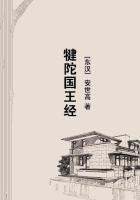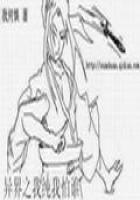The poor boy's letter did not say much.He had been too proud to acknowledge the tenderness which his heart felt.He only said, that on the eve of a great battle, he wished to bid his father farewell, and solemnly to implore his good offices for the wife--it might be for the child--whom he left behind him.He owned with contrition that his irregularities and his extravagance had already wasted a large part of his mother's little fortune.He thanked his father for his former generous conduct; and he promised him that if he fell on the field or survived it, he would act in a manner worthy of the name of George Osborne.
His English habit, pride, awkwardness perhaps, had prevented him from saying more.His father could not see the kiss George had placed on the superscription of his letter.Mr.Osborne dropped it with the bitterest, deadliest pang of balked affection and revenge.His son was still beloved and unforgiven.
About two months afterwards, however, as the young ladies of the family went to church with their father, they remarked how he took a different seat from that which he usually occupied when he chose to attend divine worship; and that from his cushion opposite, he looked up at the wall over their heads.This caused the young women likewise to gaze in the direction towards which their father's gloomy eyes pointed: and they saw an elaborate monument upon the wall, where Britannia was represented weeping over an urn, and a broken sword and a couchant lion indicated that the piece of sculpture had been erected in honour of a deceased warrior.The sculptors of those days had stocks of such funereal emblems in hand; as you may see still on the walls of St.
Paul's, which are covered with hundreds of these braggart heathen allegories.There was a constant demand for them during the first fifteen years of the present century.
Under the memorial in question were emblazoned the well-known and pompous Osborne arms; and the inscription said, that the monument was "Sacred to the memory of George Osborne, Junior, Esq., late a Captain in his Majesty's --th regiment of foot, who fell on the 18th of June, 1815, aged 28 years, while fighting for his king and country in the glorious victory of Waterloo.
Dulce et decorum est pro patria mori."
The sight of that stone agitated the nerves of the sisters so much, that Miss Maria was compelled to leave the church.The congregation made way respectfully for those sobbing girls clothed in deep black, and pitied the stern old father seated opposite the memorial of the dead soldier."Will he forgive Mrs.George?" the girls said to themselves as soon as their ebullition of grief was over.
Much conversation passed too among the acquaintances of the Osborne family, who knew of the rupture between the son and father caused by the former's marriage, as to the chance of a reconciliation with the young widow.
There were bets among the gentlemen both about Russell Square and in the City.
If the sisters had any anxiety regarding the possible recognition of Amelia as a daughter of the family, it was increased presently, and towards the end of the autumn, by their father's announcement that he was going abroad.He did not say whither, but they knew at once that his steps would be turned towards Belgium, and were aware that George's widow was still in Brussels.They had pretty accurate news indeed of poor Amelia from Lady Dobbin and her daughters.Our honest Captain had been promoted in consequence of the death of the second Major of the regiment on the field; and the brave O'Dowd, who had distinguished himself greatly here as upon all occasions where he had a chance to show his coolness and valour, was a Colonel and Companion of the Bath.
Very many of the brave --th, who had suffered severely upon both days of action, were still at Brussels in the autumn, recovering of their wounds.The city was a vast military hospital for months after the great battles;and as men and officers began to rally from their hurts, the gardens and places of public resort swarmed with maimed warriors, old and young, who, just rescued out of death, fell to gambling, and gaiety, and love-making, as people of Vanity Fair will do.Mr.Osborne found out some of the --th easily.He knew their uniform quite well, and had been used to follow all the promotions and exchanges in the regiment, and loved to talk about it and its officers as if he had been one of the number.On the day after his arrival at Brussels, and as he issued from his hotel, which faced the park, he saw a soldier in the well-known facings, reposing on a stone bench in the garden, and went and sate down trembling by the wounded convalescent man.
"Were you in Captain Osborne's company?" he said, and added, after a pause, "he was my son, sir."The man was not of the Captain's company, but he lifted up his unwounded arm and touched-his cap sadly and respectfully to the haggard broken-spirited gentleman who questioned him."The whole army didn't contain a finer or a better officer," the soldier said."The Sergeant of the Captain's company (Captain Raymond had it now), was in town, though, and was just well of a shot in the shoulder.His honour might see him if he liked, who could tell him anything he wanted to know about--about the --th's actions.But his honour had seen Major Dobbin, no doubt, the brave Captain's great friend; and Mrs.Osborne, who was here too, and had been very bad, he heard everybody say.They say she was out of her mind like for six weeks or more.But your honour knows all about that--and asking your pardon"--the man added.
Osborne put a guinea into the soldier's hand, and told him he should have another if he would bring the Sergeant to the Hotel du Parc; a promise which very soon brought the desired officer to Mr.Osborne's presence.















